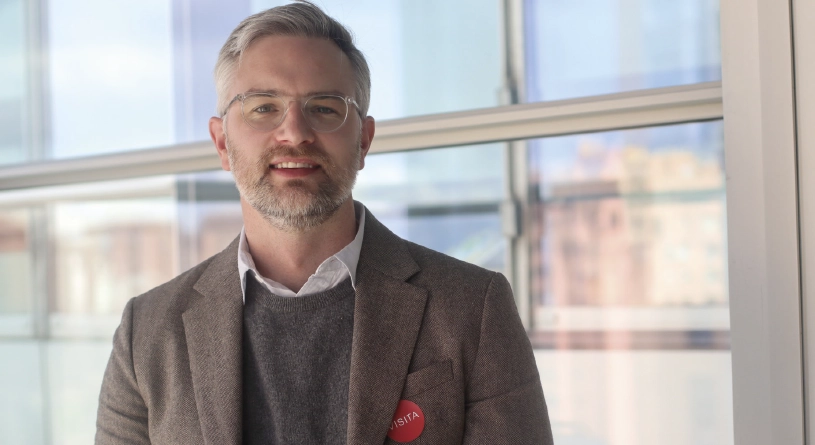Cameron McAlpine: “There are many reasons why we have to sleep, some of which we don’t even know yet”
Icahn School of Medicine at Mount SinaiCardiovascular Research InstituteNew York (United States)

Cameron McAlpine’s laboratory focusses on the study of brain-body interactions in cardiovascular and neurological pathologies and incorporates innovative tools and approaches to study at the interface of immunology, cardiology, and neuroscience to study the fundamental impact of neuro-immune interactions and brain-body communication in heart and brain diseases. Specifically, he studies how a lack of sleep is associated with inflammation. His research has determined that when we get the right number of hours of good quality sleep, levels of inflammation go down and, therefore, there is less cardiovascular risk.
How many hours should we sleep and what is good sleep?
Many studies have tackled this subject. In principle, for a healthy adult, it is recommendable to sleep between 7 and 8 hours each day. And that’s very important because it’s related with better cardiovascular health. Also, more and more studies show that it is also important to have a sleep routine. That means sleeping and getting up, more or less at the same time every day. In fact, it has been found that sleep patterns at the weekends compared to weekdays should be as similar as possible because they have an impact on cardiac health.
What happens while we sleep that is so healthy?
There are many reasons why we have to sleep, some of which we don’t know yet. One of them is that during our sleeping hours our brain carries out a kind of cleaning in its metabolism. But there are many more, other systems, signalling pathways, etc. that use this time to reset themselves.
In the laboratory, we analyse a series of immune cells in the context of sleep, including stem cells and progenitor cells. It seems that sleep keeps these cells in a healthy state through, for instance, influencing their epigenetic programmes or maintaining a balance in cell production so that, for instance, there is not an exacerbated production of monocytes, which would be prejudicial for the immune system.
What connection is there between sleeping well and longevity?
My group doesn’t research the connection between sleep and longevity. But it is true that clinical data suggest that inadequate sleep is associated with higher mortality, not just cardiovascular but from other inflammatory diseases or cancer. That’s why it is likely that a relationship exists between a person’s sleep patterns throughout their life and longevity.
Sleep is associated with cardiovascular diseases, depression, Alzheimer’s, etc. Should adequate sleep be prescribed as a preventive therapy?
Because we now know more about how sleep influences our health, it would be more than logical for primary care physicians in particular, to consider it as a factor to manage. In my opinion, we haven’t paid enough attention to sleep as a factor in the management of many diseases, whereas emphasis has been put on other things, such as a healthy diet or exercise, which are also important. My work consists of proving that sleep is a factor that is as determinant as other parameters and, as such, forms part of a healthy lifestyle. Little by little, we are getting there. Last year, the American Heart Association Foundation noted that sleep is a key factor in controlling cardiovascular disease, on a par with blood pressure, cholesterol, diet, physical activity, etc. Primary care physicians should talk to their patients about it.
Is that something that usually happens?
Questions about rest habits are probably not asked as often as they should be.
As we get older, we sleep less and worse. Is that pathological or is it a normal part of the ageing process?
The truth is that we don’t fully understand. The number of hours sleep we need changes according to age. From a baby’s 20 hours, to the 6 or 7 of an older person. We don’t know why this need changes over the years, nor how it influences diseases like Alzheimer’s or cardiovascular disease. We have to continue studying, on the one hand, why we sleep less as we get older, and on the other, the connection between sleep and certain diseases.
One of the greatest problems of the 21st century is insomnia and sleep problems.
There is a worldwide epidemic of insomnia. More and more people have sleep problems. The causes? There are many, but it is clear that technology —screens, mobile phones, etc.— represents a major external factor.
This situation is particularly worrying in adolescents, among whom we are seeing an increase in sleep pattern disorders. Screens are changing their sleep habits, and we don’t know the repercussions this will have on their health as adults. That is the question… whether the bad sleep patterns of adolescents and young people will increase their risk of chronic conditions, like cardiovascular diseases or Alzheimer’s in the future. A lot of research remains to be done in this field.
We are conducting studies, with animals and mice, about sleeping habits —few hours, segmented sleeping, etc.—. But we need more research on adolescents.
Your work combines clinical and basic research.
I don’t have medical training, but I work in a hospital, which has made me understand how important it is that our work should combine clinical and basic research. This is important for any research, but particularly when studying sleep. Animals have sleep patterns that are very different to those of humans, which is why it is essential.
I hope that my research has impact on the general public, on how to identify new therapies or influence public health policies that promote good sleeping habits. But I would be lying if I didn’t say that what really interests me is the discovery of new basic principles in biology.
Cameron McAlpine gave the seminar “Sleep calibrates immunological and cardiovascular health”, at the invitation of Dr. Borja Ibáñez.













